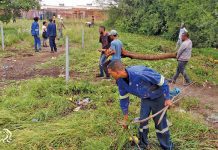If statistics from the South African Poultry Association (Sapa) are anything to go by, it’s chickens, chickens, and chickens all the way to the bank. Average broiler production per week has grown steadily over the last three years – from 7,6 million broilers in 1990 to 13,8 million last year. The local chicken market is estimated to have grown by 11,1% to R13,6 billion from March 2006 to March 2007.
And riding the wave is Dave Hanbury of Hanbury Chickens in Ashley Valley, 30km west of Pietermaritzburg, whose production over the last four years has increased from 40 000 broilers per week to 50 000. “My grandfather bought the farm in the late 50s and started dairy farming,” says Dave, “He soon realised it wasn’t going to be profitable enough, so he started farming chickens on a small scale.” The farm has been growing steadily ever since. Dotted around the 330ha farm are 24 chicken houses, each housing 16 500 to 17 000 chickens, which are processed at a rate of three houses per week.
Over the hill, Dave’s brother Rob runs a sister operation – the breeding farm which supplies fertilised eggs to an independent hatchery. Dave buys back the day-old Cobb broiler chicks for his operation. Adding value Dave also runs 150 Bonsmara breeding cows, which graze the kikuyu pastures around the chicken houses, and 70ha of maize.
While Dave’s core business is fresh whole birds and cut-up portions, he allocates a small portion of birds to value-added products. “Our ideal mix is 70% whole chickens, 20% cut-up portions and 10% value-added products,” says Dave. “We’ve developed an extensive specialty product line over the years but it’s a fiddle and quite labour intensive and I don’t believe it’s worth the effort. That’s why I’m cutting down on the product range. It’s better to stick to a few core products, such as marinated flatties. We don’t want to lose value-added products entirely as it’s nice to offer customers a slight variation, and if a customer requests a product, we have the facilities to produce it.”
With chickens as his livelihood, it’s in Dave’s own interest to keep them healthy and disease-free. Even if a disease doesn’t kill the bird, it will affect its growth rate – and with a short 35-day or five-week growing period, this doesn’t leave much time to fight off disease. A short lifespan “I heard an interesting fact about this the other day,” recalls Dave. “From the time the egg is fertilised, the chicken spends three weeks in the egg. In the past, the chicken would have had 60 days from the time of hatching to slaughter. Over the years, this has been reduced to 42 days and now to 35 days. That means the chicken is spending almost as much time in the egg as it does in the chicken house.
They have no time in their short lives to fight off disease. They need a nice clean and dry environment.” Birds are reared in capacious 78m long chicken houses. “All our chickens are placed in a ‘free range’ environment,” explains Dave. “This doesn’t mean they’re running around outside – they would die if they were – but they have free rein to run around inside the house. The houses are clean and dry and have a thick carpet of untreated wood shavings.”
Chicks stay together in the same house from day 1 to slaughter at day 35. The sides of the houses can be opened in the hot summer months to provide additional ventilation. An automatic monitoring system activates massive fans to provide cooling, and coal boilers operating off a thermostat blow in warm air in winter. The lower a farm’s mortality rate, the more efficient the farm is – and Dave is satisfied with his farm’s mortality rate of about 5%. The farm used to grow Ross broilers as well as Cobbs, but now Dave only uses Cobbs. “It’s a bird that’s well-suited to our area. It converts feed efficiently. The feed conversion ratio can be as low as 1,65 but on average it’s 1,75. Birds are fed a balanced diet supplied by Nutrex, which is free of added hormones, steroids, antibiotics and animal byproducts.”
Processing plant In 2003, Dave completed a modern poultry processing plant on the farm. The plant is fully registered and has many advantages. “Generally the whole farm operation has improved since the plant opened,” says Dave. “It’s provided us with extra capacity in terms of the number of birds we can process each week. It also improved product flow and hygiene and eliminates the unnecessary stress placed on the birds when they’re transported to an off-site abattoir.” The abattoir is run according to a stringent hygiene routine, and is thoroughly washed and sanitised at the end of each day. “The health department inspects us every month and we have an independent audit performed every six months to ensure we remain on top of our game in terms of hygiene and traceability.”
The abattoir utilises an air chiller to chill carcasses rapidly and effectively and minimise water uptake. “Our customers aren’t paying for water, they’re paying for meat,” says Dave. Service and quality Hanbury Chickens supplies major retailers and butcheries in KwaZulu-Natal. The farm’s reasonably close proximity to customers (and fleet of four refrigerated four-ton and eight-ton trucks) ensure Hanbury Chickens gets their products to their customers quickly and regularly.
“The customer knows they’re getting a fresh product and reliable service, which builds customer loyalty,” Dave says. Hanbury Chickens is content with the size of the operation and isn’t looking to make many changes. “We will keep growing as demand warrants it,” says Dave. “The economy is picking up and more and more people can afford chicken and meat. The increase in the beef price has been good for us. We’re quite happy as a locally-based business and at the moment there’s no need to expand to other provinces. “Our business is working and people are happy with what they buy. People want cheap chickens and if we can balance that need while still looking after the welfare of the bird, we can keep everyone happy.” Contact Hanbury Chickens on (033) 330 2285 or fax (033) 330 2297, e-mail [email protected].













